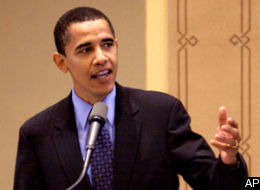This post is one in a series.
This week President Obama gave an important speech in the Oval office announcing the end of combat operations in Iraq. In October 2002, before the war was declared, he distinguished himself as one of the few political leaders to express clear opposition to the Iraq war. There is an important connection between his words and his actions, then, which I will consider in today’s post, and now, which I will consider in following posts.
The standard way to account for the connection is through cynical interpretation, explaining the texts of these speeches by referring to their context. Much is lost in such cynical interpretation–here, the two speeches are Deliberately Considered.
The Context
 On October 2, 2002, Obama was a relatively obscure politician, a State Senator considering a run for the United States Senate. He had some significant movers and shakers in Chicago eyeing him, realizing his promise. One of them, Bettylu Saltzman, who was organizing the anti-war demonstration, asked him to take part. His political advisors calculated the costs and benefits, seeing a real problem if he sought to run in a state wide race. As an African American, he might solidify his support among white liberals, fortifying the black – white coalition base of a potential run, but he may have appealed to them in any case, and he clearly would lose conservative Democratic support and the support of many independents, who at that time were overwhelmingly supporting the President and his impending war. Nonetheless, since he actually did think that war would be a big mistake, Obama decided to give the speech, notable for its moderation in his opposition to the war: “I don’t oppose all wars. What I am opposed to is a dumb war” was the recurring theme. (See David Remnick, The Bridge).
On October 2, 2002, Obama was a relatively obscure politician, a State Senator considering a run for the United States Senate. He had some significant movers and shakers in Chicago eyeing him, realizing his promise. One of them, Bettylu Saltzman, who was organizing the anti-war demonstration, asked him to take part. His political advisors calculated the costs and benefits, seeing a real problem if he sought to run in a state wide race. As an African American, he might solidify his support among white liberals, fortifying the black – white coalition base of a potential run, but he may have appealed to them in any case, and he clearly would lose conservative Democratic support and the support of many independents, who at that time were overwhelmingly supporting the President and his impending war. Nonetheless, since he actually did think that war would be a big mistake, Obama decided to give the speech, notable for its moderation in his opposition to the war: “I don’t oppose all wars. What I am opposed to is a dumb war” was the recurring theme. (See David Remnick, The Bridge).
The moderation of the speech served his immediate purposes and it later helped his candidacy in the Democratic Presidential Primaries. On this point, David Axelrod, Obama’s chief political consultant, has bemoaned the fact that there was no decent video of the speech. Obama opposed the war, but tried to . . .
Read more: Obama on Iraq: Then and Now